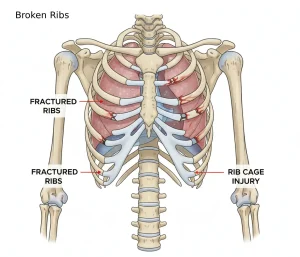Overview
Broken ribs refer to fractures in one or more of the bones that protect the chest and vital organs such as the lungs and heart. Rib fractures commonly occur after blunt trauma to the chest and can be painful, especially with movement or breathing. While many broken ribs heal on their own with supportive care, severe injuries may require close medical monitoring due to the risk of damage to internal organs.
Symptoms
Symptoms of broken ribs can range from mild to severe and often worsen with breathing or movement. Common symptoms include:
-
Sharp chest pain that increases with deep breathing, coughing, or movement
-
Tenderness or swelling over the injured area
-
Bruising of the chest wall
-
Shortness of breath or shallow breathing
-
A cracking or popping sensation during injury or movement
Severe pain may make it difficult to take deep breaths.
Causes
Broken ribs are usually caused by direct impact or pressure to the chest. Common causes include:
-
Motor vehicle accidents
-
Falls, especially onto the chest or side
-
Sports injuries involving contact or collision
-
Physical assaults or direct blows
-
Severe or repeated coughing in rare cases
Risk factors
Several factors can increase the risk of rib fractures:
-
Participation in contact sports or high-impact activities
-
Osteoporosis or weakened bones
-
Older age, due to increased bone fragility
-
Chest trauma from accidents or falls
-
Chronic lung conditions that cause frequent coughing
Complications
Most rib fractures heal without major problems, but complications can occur, particularly with multiple or severe fractures:
-
Punctured lung or collapsed lung
-
Pneumonia due to shallow breathing and poor lung expansion
-
Damage to internal organs such as the liver or spleen
-
Chronic chest pain
-
Breathing difficulties
Prompt medical care can help reduce the risk of serious complications.
Prevention
While not all rib fractures can be prevented, certain measures may reduce the risk:
-
Wearing seat belts and appropriate protective gear
-
Using protective equipment during contact sports
-
Maintaining bone strength through proper nutrition and exercise
-
Taking steps to prevent falls
-
Managing chronic coughs under medical guidance
Early evaluation and supportive care are important for proper healing and maintaining lung health.
Advertisement

